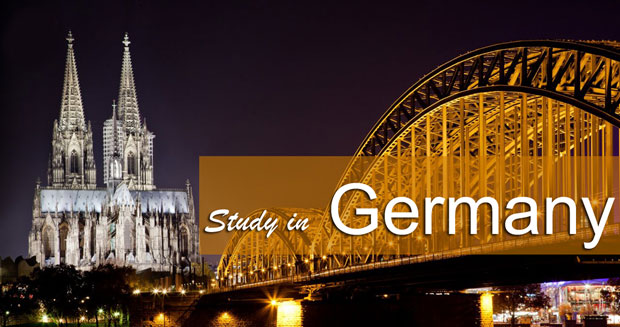



STUDENT VISA - TOURIST VISA
: 98552-36041, 99140-24043
: 0183-5061957
: support@wasuoverseas.com

Deutschland, officially the Federal Republic of Germany is a federal parliamentary republic in central-western Europe. It includes 16 constituent states, covers an area of 357,021 square kilometers , and has a largely temperate seasonal climate. Its capital and largest city is Berlin. With about 82.0 million inhabitants, Germany is the most populous member state of the European Union. After the United States, it is the second most popular human migration destination.
Germany is in Western and Central Europe, with Denmark bordering to the north, Poland and the Czech Republic to the east, Austria to the southeast, Switzerland to the south-southwest, France, Luxembourg and Belgium lie to the west, and the Netherlands to the northwest.

Most of Germany has a temperate seasonal climate dominated by humid westerly winds. The country is situated in between the oceanic Western European and the continental Eastern European climate. The climate is moderated by the North Atlantic Drift, the northern extension of the Gulf Stream. This warmer water affects the areas bordering the North Sea; consequently in the northwest and the north the climate is oceanic. Germany gets an average of 789 mm (31 in) of precipitation per year; there is no consistent dry season. Winters are cool and summers tend to be warm: temperatures can exceed 30 °C (86 °F).
Germany has a social market economy with a highly skilled labour force, a large capital stock, a low level of corruption and a high level of innovation. It is the world's third largest exporter of goods and has the largest national economy in Europe which is also the world's fourth largest by nominal GDP and the fifth one by PPP.

With its central position in Europe, Germany is a transport hub for the continent. Like its neighbors in Western Europe, Germany's road network is among the densest in the world. The motorway (Autobahn) network ranks as the third-largest worldwide in length and is known for its lack of a general speed limit.
Germany is the seventh most visited country in the world with a total of 407 million overnights during 2012. This number includes 68.83 million nights by foreign visitors. In 2012, over 30.4 million international tourists arrived in Germany. Berlin has become the third most visited city destination in Europe.
German is the official and predominant spoken language in Germany. It is one of 24 official and working languages of the European Union, and one of the three working languages of the European Commission. German is the most widely spoken first language in the European Union, with around 100 million native speakers.
Higher education in Germany is mainly funded by the state and as such it is literally free of charge for domestic and international students alike. The German higher education system consists of around 400 institutions, divided into public “tuition free” institutions that host over 2.4 million students across Germany, and a smaller number of private institutions that enroll less than 5% of the total student body.
Regardless of the free tuition fee policy, studying in Germany doesn’t come entirely for free – you still need to meet the living costs. Therefore many international students tend to look for a job to support themselves while studying. It’s worth mentioning that practice-oriented universities in Germany have agreements with great companies, providing students with internships. These may not always be paid, but could lead to a great future job after obtaining your degree.
German education institutions give out a lot of financial support and scholarships to international students on the basis of merit. So, if you are a bright student, you can rid yourself of the worry of any monetary problems.
There is an abundance of colleges and courses to choose from. This is a major reason to study in Germany. You can find numerous college-course combinations which are sure to provide an internationally acclaimed study experience. With more than 12 thousand courses and programs, a student can zero in on the course best suited to her/him.
Universities like Heidelberg University, Technical University of Berlin, University of Bonn, among others, have a global standing when it comes to the top universities of Germany. Many German universities made it to the top 200 universities according to QS and Times Higher Education (THE) rankings. The status of German colleges is in itself a mark of quality.
What better place to learn German than Germany itself? Multilingualism is a valued skill in the job market today, and German is a language that adds weight to your profile. Not only German, the large numbers of international students bring with them their own native communication systems, which indisputably create an aura of linguistic heterogeneity.
Germany has a brilliant profile of international students, coming from ALL countries – no matter how big or small. A variety of cultures provide the context for development of interest in other cultures and also a sensitized approach towards world cultures. It is a great multicultural learning center.
Finally, after studying in Germany, you’ll have the chance to stay on and seek work after you graduate. The law allows international graduates to stay for an additional 18 months to seek work, and you may even end up staying longer, if that is what you wish.
Germany has a social market economy with a highly skilled labour force, a large capital stock, a low level of corruption and a high level of innovation. It is the world's third largest exporter of goods and has the largest national economy in Europe which is also the world's fourth largest by nominal GDP and the fifth one by PPP.
With its central position in Europe, Germany is a transport hub for the continent. Like its neighbors in Western Europe, Germany's road network is among the densest in the world. The motorway (Autobahn) network ranks as the third-largest worldwide in length and is known for its lack of a general speed limit.